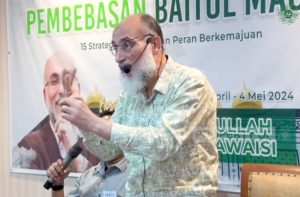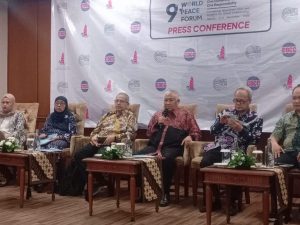Jakarta, 22 Dzulqo’dah 1437/25 August 2016 (MINA) – Any sexual relations outside marriage could soon be outlawed in this country, with some Constitutional Court (MK) justices signaling their support for the idea, which is currently under consideration at the court.
In the latest hearing of a judicial review of the Criminal Code, which is aimed at outlawing casual sex, justice Patrialis Akbar concurred with three expert witnesses presented by the plaintiffs, who argued that Indonesia’s legal system was “too liberal”, Jakarta Post reported.
“Our freedom is limited by moralistic values as well as religious values. This is what the declaration of human rights doesn’t have. It’s totally different [from our concept of human rights] because we’re not a secular country, this country acknowledges religion,” he said.
Patrialis, a former National Mandate Party (PAN) politician, asked the experts whether or not all laws in Indonesia should accommodate religious norms.
Also Read: Floods Spread in North Aceh, Eight Districts Submerged
“If the principles that have been comprehensively explained [by the expert witnesses] are not enforced in the existing law in this country, would this country be a secular country where religion no longer needed to be respected?”
After asking the question, Patrialis pointed out that the Constitutional Court was an institution that was “guided by the light of God”.
Another judge, Aswanto, asked whether it was about time that casual sex should not only be punished by social norms but also by the law.
“I was a bit annoyed with what the government said, [that we should] let people commit zinah [adultery or casual sex] and not regard them as criminals. It’s a little bit annoying. I believe casual sex is a crime,” he said.
Also Read: Chinese Investment in Central Java Surges; Fujian Proposes Direct Semarang–Fuzhou Flight
Aswanto was responding to a representative from the Law and Human Rights Ministry, who told the court that if the panel of justices accepted the plaintiff’s demand, then hundreds of thousands of people could be criminalized.
During Tuesday’s hearings, the expert witnesses focused on attacking the concept of universal human rights, saying that it was not applicable in Indonesia because the country was built on religious norms.
“The application of universal human rights has to consider the special situation in a country,” Padjadjaran University law professor Atip Latipulhayat said.
Therefore, the concept of universal human rights would be dangerous if it was applied without considering religious norms, he added.
Also Read: Umar ibn Al-Khattab’s Speech Before Entering Jerusalem Highlighted at AWG Commemoration
Atip told the court that the LGBT (Lesbian, Gay, Bisexual and Transgender) community did not have the rights of other Indonesian citizens.
“For Indonesia, LGBT is not [a human] right. The right of the LGBT people is to be humanized with Indonesian values because our law clearly stipulates that a marriage is between a man and a woman,” he said.
University of Indonesia (UI) constitutional law expert Hamid Chalid, who also testified as an expert witness, said the current Criminal Code was too liberal as it was drafted by the Dutch.
“Our country has silently legalized sex outside marriage, rape of men and sex between same-sex couples. Our law has been so liberal because we have allowed it to be like that for too long. Is that what we want?” he said.(T/R04)
Also Read: The Four Cultural Pillars of Bayt al-Maqdis to Strengthen the Movement for Al-Aqsa’s Liberation
Mi’raj Islamic News Agency (MINA)

































 Mina Indonesia
Mina Indonesia Mina Arabic
Mina Arabic